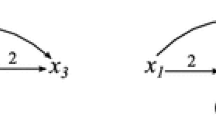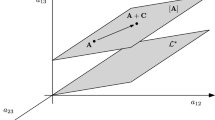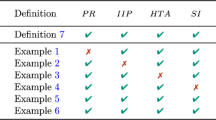Abstract
This paper deals with the evaluation of preference consistency in decision making, assuming that decision makers express their preferences by means of pairwise comparisons in the set of alternatives. Preferences can be expressed using one of the various known representations, such as fuzzy preference relations or multiplicative pairwise comparison matrices. A geometrical characterization of inconsistency evaluation is proposed by considering a pairwise comparison matrix as a point in the vector space of square matrices of order n and by using different metrics to measure deviation of this matrix from full consistency. An inconsistency index is defined as the minimum distance of a pairwise comparison matrix from a consistent one, according to a fixed metric. Consequently, to each choice of a particular metric corresponds an inconsistency index. Geometrical properties of the subset of consistent matrices are investigated.
Access this chapter
Tax calculation will be finalised at checkout
Purchases are for personal use only
Preview
Unable to display preview. Download preview PDF.
Similar content being viewed by others
References
Barzilai, J.: Consistency measures for pairwise comparison matrices. Journal of Multi-Criteria Decision Analysis 7, 123–132 (1998)
Brunelli, M., Fedrizzi, M.: Characterizing properties of inconsistency indices for pairwise comparison matrices. Submitted to European Journal of Operational Research (2011)
Brunelli, M., Canal, L., Fedrizzi, M.: Inconsistency indices for pairwise comparison matrices: a numerical study. Submitted to Annals of Operations Research (2011)
Cavallo, B., D’Apuzzo, L.: Characterizations of Consistent Pairwise Comparison Matrices over Abelian Linearly Ordered Groups. International Journal of Intelligent Systems 25, 1035–1059 (2010)
Cavallo, B., D’Apuzzo, L., Squillante, M.: About a consistency index for Pairwise Comparison Matrices over a divisible alo-group. International Journal of Intelligent Systems 27, 153–175 (2012)
Chiclana, F., Herrera, F., Herrera-Viedma, H.: Integrating multiplicative preference relations in a multipurpose decision-making model based on fuzzy preference relations. Fuzzy Sets and Systems 122, 277–291 (2001)
Choo, E.U., Wedley, W.C.: A common framework for deriving preference values from pairwise comparison matrices. Computers and Operations Research 31, 893–908 (2004)
Chu, A.T.W., Kalaba, R.E., Springarn, K.: A comparison of two methods for determining the weights of belonging to fuzzy sets. Journal of Optimization Theory and Applications 27, 321–538 (1979)
Chu, M.T.: On the optimal consistent approximation to pairwise comparison matrices. Linear Algebra and its Applications 272, 155–168 (1998)
Cook, W.D., Kress, M.: Deriving weights from pairwise comparison ratio matrices: An axiomatic approach. European Journal of Operational Research 37, 355–362 (1988)
Crawford, G., Williams, C.: A note on the analysis of subjective judgement matrices. Journal of Mathematical Psychology 29, 25–40 (1985)
Fedrizzi, M.: On a consensus measure in a group MCDM problem. In: Kacprzyk, J., Fedrizzi, M. (eds.) Multiperson Decision Making Models using Fuzzy Sets and Possibility Theory, Theory and Decision Library. Series B: Mathematical and Statistical Methods, vol. 18, pp. 231–241. Kluwer Academic Publ., Dortrecht (1990), http://www.unitn.it/files/download/10528/9_2010.pdf
Fedrizzi, M., Fedrizzi, M., Marques Pereira, R.A.: On the issue of consistency in dynamical consensual aggregation. In: Bouchon Meunier, B., Gutierrez Rios, J., Magdalena, L., Yager, R.R. (eds.) Technologies for Constructing Intelligent Systems. STUDFUZZ, vol. 89, pp. 129–137. Springer, Heidelberg (2002)
Fichtner, J.: Some thoughts about the mathematics of the analytic hierarchy process. Report 8403, Institut für Angewandte Systemforschung und Operations Research, Hochschule der Bundeswehr München (1984)
Fichtner, J.: On deriving priority vectors from matrices of pairwise comparisons. Socio–Econ. Plann. Sci. 20, 341–345 (1986)
Gantmacher, F.R.: The theory of matrices, Chelsea, vol. 1 (1959)
Golden, B.L., Wang, Q.: An alternate measure of consistency. In: Golden, B.L., Wasil, E.A., Harker, P.T. (eds.) The Analythic Hierarchy Process, Applications and Studies, pp. 68–81. Springer, Heidelberg (1989)
Koczkodaj, W.W.: A new definition of consistency or pairwise comparisons. Mathematical & Computer Modelling 18, 79–84 (1993)
Koczkodaj, W.W., Orlowski, M.: An orthogonal basis for computing a consistent approximation to a pairwise comparison matrix. Computers Math. Applic. 34, 41–47 (1997)
Peláez, J.I., Lamata, M.T.: A new measure of consistency for positive reciprocal matrices. Computers and Mathematics with Applications 46, 1839–1845 (2003)
Ramík, J., Korviny, P.: Inconsistency of pair-wise comparison matrix with fuzzy elements on the geometric mean. Fuzzy Sets and Systems 161, 1604–1613 (2010)
Saaty, T.L.: Highlights and critical points in the theory and application of the Analytic Hierarchy Process. European Journal of Operational Research 74, 426–447 (1994)
Saaty, T.L.: A scaling method for priorities in hierarchical structures. Journal of Mathematical Psychology 15, 234–281 (1977)
Shiraishi, S., Obata, T., Daigo, M.: Properties of a positive reciprocal matrix and their application to AHP. Journal of the Operations Research Society of Japan 41, 404–414 (1998)
Stein, W.E., Mizzi, P.J.: The harmonic consistency index for the analythic hierarchy process. European Journal of Operational Research 177, 488–497 (2007)
Author information
Authors and Affiliations
Editor information
Editors and Affiliations
Rights and permissions
Copyright information
© 2012 Springer-Verlag Berlin Heidelberg
About this paper
Cite this paper
Fedrizzi, M. (2012). Distance–Based Characterization of Inconsistency in Pairwise Comparisons. In: Greco, S., Bouchon-Meunier, B., Coletti, G., Fedrizzi, M., Matarazzo, B., Yager, R.R. (eds) Advances in Computational Intelligence. IPMU 2012. Communications in Computer and Information Science, vol 300. Springer, Berlin, Heidelberg. https://doi.org/10.1007/978-3-642-31724-8_4
Download citation
DOI: https://doi.org/10.1007/978-3-642-31724-8_4
Publisher Name: Springer, Berlin, Heidelberg
Print ISBN: 978-3-642-31723-1
Online ISBN: 978-3-642-31724-8
eBook Packages: Computer ScienceComputer Science (R0)




